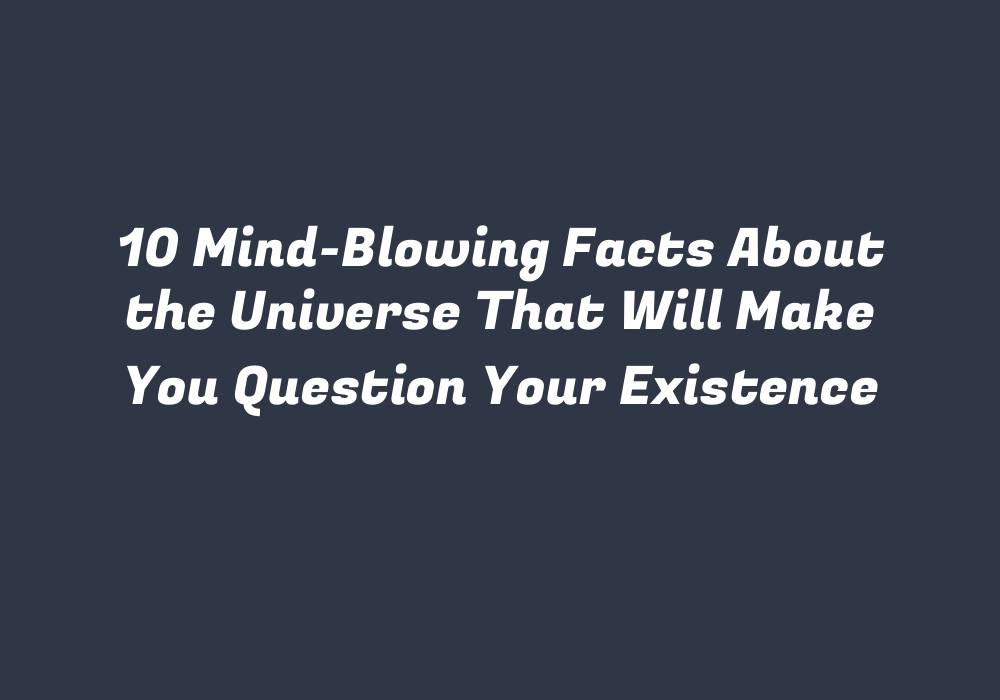Exploring the Vast Mysteries of Our Universe
Our universe is vast, intriguing and filled with awe-inspiring wonders that continue to astound scientists, philosophers, and dreamers alike. In this article, we will delve into 10 mind-blowing facts about the universe that have the potential to make us question our very existence.
1. The Universe Has an Immeasurable Size
The extent of our universe is almost unfathomable, stretching across multiple dimensions and encompassing a vast array of stars, galaxies, and other celestial bodies. Scientists believe that the observable part of the universe measures about 93 billion light-years in diameter, although this could be an infinitesimal fraction compared to the true size of our universe. This makes us realize how minuscule our planet Earth truly is.
2. Our Galaxy is Only One Among Billions
The Milky Way is home to over 100 billion stars, yet this vast collection of celestial bodies is only one among billions of galaxies in our observable universe. These galactic formations come in a variety of shapes and sizes, each with its own unique characteristics and features. Knowing that the universe is filled with endless star systems beyond our Milky Way prompts us to wonder if there’s life elsewhere within these distant celestial cities.
3. The Expansion of the Universe Accelerates
The universe, like an inflating balloon, is not only expanding but doing so at an accelerated pace. This expansion rate has been increasing over time due to a mysterious force known as dark energy. As galaxies move further apart from each other at faster speeds, the probability of interstellar contact between them diminishes, which raises questions about the future possibilities of communication and collaboration among different civilizations in our ever-expanding cosmos.
4. Time Flows Differently Throughout the Universe
In the universe, time seems to flow at different rates depending on one’s location or movement through space-time. According to Einstein’s theory of relativity, objects moving relative to each other experience time differently based on their velocities and distances apart. This peculiar aspect of our universe makes us ponder if our perception of reality might not be universally shared by all observers.
5. The Universe Has a Dark Side
Approximately 85% of the contents of the universe are invisible and unknown, making up what is referred to as dark energy and dark matter. These mysterious elements have baffled scientists for years, leaving us with many unanswered questions about their origins, composition, and roles in shaping our cosmos. This vast unknown realm challenges us to reimagine how much of the universe remains unexplored.
6. Life Could Exist Within Parallel Universes
The multiverse theory posits that our universe is just one among an infinite number of universes, each with its own unique set of laws and dimensions. If true, this concept raises the possibility that there could be other civilizations living in these parallel universes, engaging in their own distinct experiences separate from ours. This idea expands our understanding of the vastness of the cosmos and opens up a world of potential encounters with other forms of life.
7. Our Sun is a Common Star Among Many Others
Our sun, a G-type main-sequence star located near the center of our solar system, is just one example of a vast array of stars in the universe. There are at least 100 billion stars within our Milky Way alone, and billions more can be found in other galaxies. This abundance of stellar bodies makes us realize that Earth’s existence is not unique or extraordinary but rather part of a larger galactic tapestry where countless stars share their light and energy.
8. Life on Earth May Not Be Unique
Over the past few decades, various studies have hinted at the possibility that life might exist on other celestial bodies within our solar system, including Saturn’s moon Titan and Mars. Moreover, with the discovery of exoplanets orbiting other stars in our galaxy, scientists are eager to explore if these distant worlds could harbor their own forms of life. Knowing that our Earth isn’t the only place where life may have emerged challenges us to rethink what it means to be human and our role within a vast, living cosmos.
9. Our Universe May Have Been Born From Another
The idea of cyclic cosmology suggests that the universe may have originated from an earlier universe, which in turn emerged from yet another one before it. This concept introduces a never-ending sequence of cosmic births and deaths, challenging our notions of beginnings and endings. As we contemplate these ideas, we are reminded that time is relative, and the true nature of reality may be beyond our comprehension.
10. The Universe is Full of Mysteries and Wonders
As we explore the vast mysteries of our universe and question our place within it, one thing remains certain: the cosmos is filled with enigmas that continue to inspire awe in us as humans. Our journey through the stars, galaxies, and time itself reminds us that there’s still much to learn about our existence and our connection to the vast universe surrounding us.
In summary, each of these mind-blowing facts about the universe serves to remind us that life on Earth is just one small piece in an immense cosmic puzzle. As we continue to explore this vast expanse, the more it becomes evident that there are countless mysteries yet to be uncovered, and our existence may never truly be fully understood.
